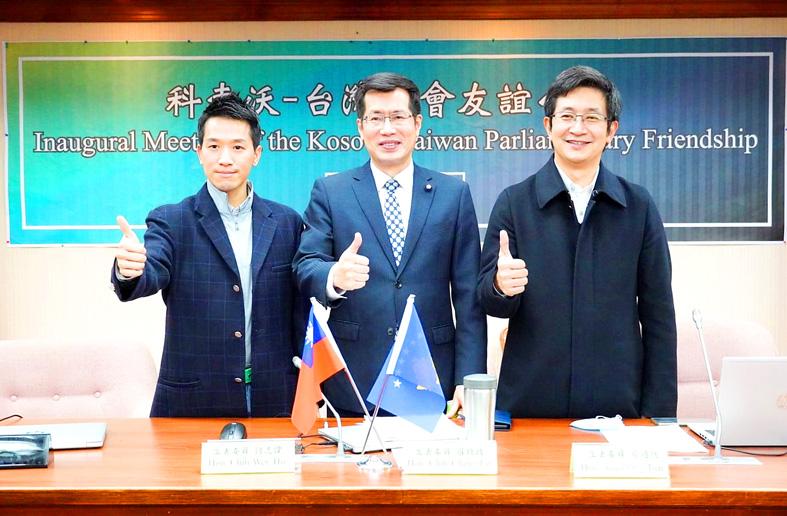A Taiwanese legislative friendship group aimed at building closer ties with Kosovo on Monday was formed during a videoconference with the Kosovo-Taiwan Parliamentary Friendship Group, which was established at the same time.
The Taiwanese group, which is made up of 39 lawmakers from across party lines, was assembled by Democratic Progressive Party (DPP) Legislator Lo Chih-cheng (羅致政), who is chairman of the group, while DPP Legislator Ho Chih-wei (何志偉) is the vice chairman, Lo’s office said in a statement.
The Kosovar Assembly’s Committee on Foreign Affairs and Diaspora on June 15 approved a motion to establish a parliamentary group to develop ties with Taiwan.

Photo: screen grab from Facebook
The motion was proposed by five Kosovar lawmakers from across the political spectrum, including Adriana Matoshi of the ruling Levizja Vetevendosje party.
Lo then contacted the five lawmakers and they established the two parliamentary friendship groups to increase legislative exchanges, improve mutual understanding and expand the two nations’ international space, Lo’s office said.
Hailing the establishment of the legislature’s first parliamentary friendship group with a Balkan nation, Lo said that the videoconference was a major step in the development of relations between lawmakers in Taiwan and Kosovo.
The two nations have many things in common, such as the pursuit of sovereignty and democratic values, and both are struggling for economic survival and international recognition, he said.
When Kosovo declared independence from Serbia in 2008, Taiwan was among a handful of nations that immediately recognized its independence, he added.
Matoshi, who leads the Kosovo-Taiwan Parliamentary Friendship Group, did not attend the videoconference as she was in hospital, but several members of the group were present, including Blerta Deliu-Kodra of the Democratic Party of Kosovo, who is vice chairwoman of the group.
Deliu-Kodra said during the videoconference that there was plenty of room to expand exchanges between Taiwan and Kosovo, and that the establishment of the groups marked an important stage in the development of bilateral relations.
Most importantly, Taiwan and Kosovo, as two democratic nations, would fight against authoritarianism side by side, Deliu-Kodra said.
During the videoconference, the two groups agreed to conduct parliamentary exchanges, and facilitate economic cooperation and people-to-people exchanges.
They also welcomed visits by group members next year, a statement said.

NATIONAL SECURITY THREAT: An official said that Guan Guan’s comments had gone beyond the threshold of free speech, as she advocated for the destruction of the ROC China-born media influencer Guan Guan’s (關關) residency permit has been revoked for repeatedly posting pro-China content that threatens national security, the National Immigration Agency said yesterday. Guan Guan has said many controversial things in her videos posted to Douyin (抖音), including “the red flag will soon be painted all over Taiwan” and “Taiwan is an inseparable part of China,” while expressing hope for expedited “reunification.” The agency received multiple reports alleging that Guan Guan had advocated for armed reunification last year. After investigating, the agency last month issued a notice requiring her to appear and account for her actions. Guan Guan appeared as required,

Japan and the Philippines yesterday signed a defense pact that would allow the tax-free provision of ammunition, fuel, food and other necessities when their forces stage joint training to boost deterrence against China’s growing aggression in the region and to bolster their preparation for natural disasters. Japan has faced increasing political, trade and security tensions with China, which was angered by Japanese Prime Minister Sanae Takaichi’s remark that a Chinese attack on Taiwan would be a survival-threatening situation for Japan, triggering a military response. Japan and the Philippines have also had separate territorial conflicts with Beijing in the East and South China

A strong cold air mass is expected to arrive tonight, bringing a change in weather and a drop in temperature, the Central Weather Administration (CWA) said. The coldest time would be early on Thursday morning, with temperatures in some areas dipping as low as 8°C, it said. Daytime highs yesterday were 22°C to 24°C in northern and eastern Taiwan, and about 25°C to 28°C in the central and southern regions, it said. However, nighttime lows would dip to about 15°C to 16°C in central and northern Taiwan as well as the northeast, and 17°C to 19°C elsewhere, it said. Tropical Storm Nokaen, currently

PAPERS, PLEASE: The gang exploited the high value of the passports, selling them at inflated prices to Chinese buyers, who would treat them as ‘invisibility cloaks’ The Yilan District Court has handed four members of a syndicate prison terms ranging from one year and two months to two years and two months for their involvement in a scheme to purchase Taiwanese passports and resell them abroad at a massive markup. A Chinese human smuggling syndicate purchased Taiwanese passports through local criminal networks, exploiting the passports’ visa-free travel privileges to turn a profit of more than 20 times the original price, the court said. Such criminal organizations enable people to impersonate Taiwanese when entering and exiting Taiwan and other countries, undermining social order and the credibility of the nation’s